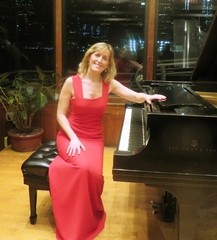|
Back
From Smanioso to Accarezzevole New York
Barge Music
04/23/2016 -
Sergei Prokofiev: Sarcasms, Opus 17
Sergei Rachmaninoff: Moments Musicaux, No. 1, 2, 3 & 4, Opus 16
Alexander Scriabin: Sonata No. 5, Opus 23 – Prelude for the Left Hand, Opus 9, No. 1 – Preludes No. 1 in C Major & No. 2 in A minor, Opus 11
Andy Akiho: Vick(I/y)
George Gershwin: Rhapsody in Blue
Olga Vinokur (Pianist)

O. Vinokur at BargeMusic (© Samuel A. Dog)
Olga Vinokur, the Russian/Israel/American pianist never fails to impress. Last night at BargeMusic, she impressed the audience with bright virtuosity, a well-chosen program of Russian and American music, endlessly challenging selections, and an affinity to please audiences with her proficiency and personality.
Impressing an audience is one thing. Moving an audience is something completely different. When one hears truly monumental great pianists in recital–an Ashkenazy, a Brendel, a Trifonov–discussion of technique or interpretation come second. Initially, one doesn’t remark how the fingers moved or the scales were executed. Initially, one comes out of a concert-hall bouncing that single, non-descriptive gestalt verdict: “Wow!”
Ms. Vinokur does not have that “Wow” quality, though her assets are plentiful. Choosing to play all the Prokofiev Sarcasms, or climbing the summit of the Scriabin Fifth Sonata, what Richter called “the most difficult piece in the piano repertory”, she is doing miraculous things with her fingers and her mind.
But that ineffable spiritual quality somehow evades her.
Mind you, the Sarcasms are such titanically volcanic works that few pianists attempt playing them in concert. Ms. Vinokur has technique to spare, and she plunged through those esoteric commands like “smanioso” (restless, agitated) and “precipitosissimo” as if her life depended on them. Prokofiev’s 1910 young and mad period works, are so aggressive that Ms. Vinokur tore through them with little regard for their singularity. Yet, the rare leavening, like the improvisations of the Allegro rubato with their arpeggio flourishes, and the bitonal third Sarcasm were simply part of the whole belligerent piece. She played those fast repeating chords, those brusque patches brilliantly, yet when you have all black, somehow those rare bits of sunlight are missing.
When it came to Scrabin’s Fifth Sonata, though, Ms. Vinokur had it right. She had started the concert with those unpretentious early Scriabin Preludes, so the last Sonata made more of an impact as the real composer. (Or else, the alcohol had made for less compromising inspiration).
BargeMusic is a beautiful place to perform, but rarely do they add program notes, and the poems which the composer appended to the Fifth would have given the music more impact, since Scriabin was a most pictorial composer. Nonetheless, after those first few absolutely mad measures, Ms. Vinokur sailed through the Fifth with, what seemed like, precise attention to the numerous arcane directions. I don’t know of any other composer using the word Accarezzevole, but she played this early section with, yes, fawning care. Even the strange quirky measures in between the ravishing storms, might have been “the timorous embryos of life” from the poem. It was a memorable performance.
Ms. Vinokur chose her three composers well: Scriabin the brain-fierce visionary, Prokofiev, the disciplined young cynic, and finally Rachmaninoff, here the 23-year-old Romantic, who never lost that sense of romance.
I wonder whether Ms. Vinokur appreciated the early genius of the composer, for instead of four totally different works (she didn’t play the last two), they had a sameness. The inspiration of those raindrops at the end of the First Moment Musicaux somehow mixed in with the 16th-note triplets of the Second. The Presto tempo of the Fourth was impressive indeed, yet this is a movement of stormy ebb and flow. One felt the ebb of this soundscape, but it rarely was given breath or breadth.
To repeat, this was a most impressive performance, but she seemed to be showing Rachmaninoff (and Vinokur) the virtuoso, not the poet.
The second half started with a performance of Andy Akiho’s Vick(I/y) named for two friends beginning with “Vick” but with a different ending. I had heard Ms. Vinokur play this before, and it is just as jovial. The “prepared piano” gave off delicious notes from bass guitar to quarter-tones, to Tin Pan Alley clanging. From fast to slow, loud to soft, Mr. Akiho’s piece gave a wide range of colors which must have been a delight to write, and were played with restrained humor.
The final work was rare indeed. The original Gershwin Rhapsody in Blue written for solo piano. The more popular orchestration, was written with the masterly help of Ferde Grofé (who did with Gershwin what the late George Martin did with the Beatles), but Ms. Vinokur sailed through the solo piano with all the virtuosic powers at her command.
Frankly, that mawkish romantic theme toward the end of Rhapsody sounded less schmaltzy as a solo than with those lush strings of the orchestra. For this alone, it was good Gershwin. Not jazzy, not 1920’s-style Über-pop, but as the issue of a composer who, like Schubert and Mozart, was unable to block innate pure inspiration.
Harry Rolnick
|